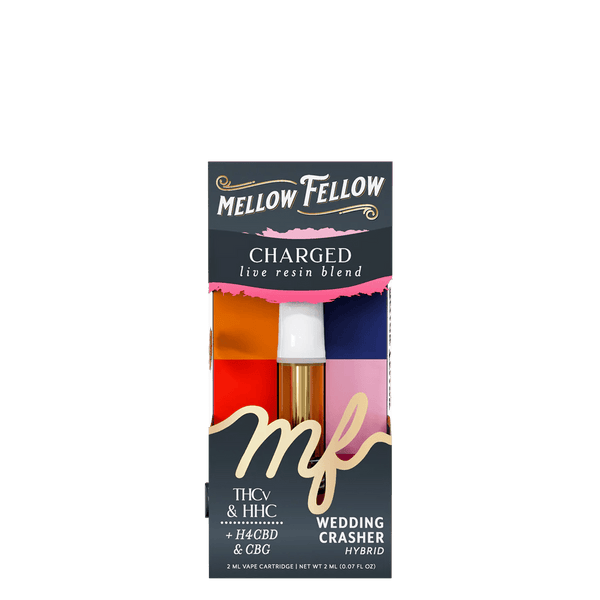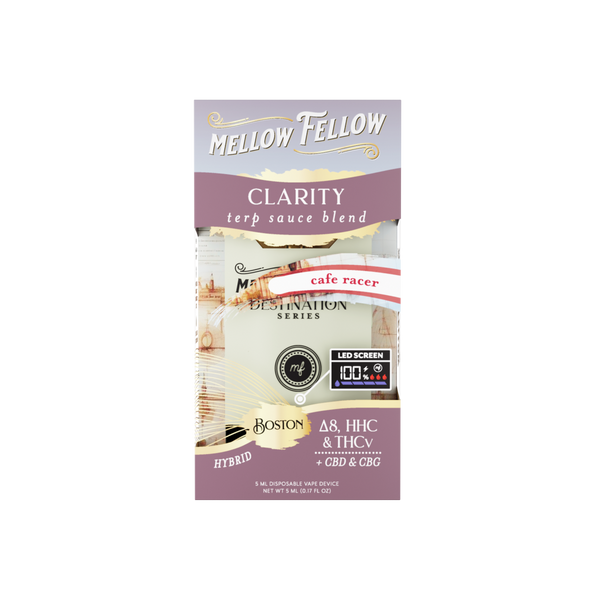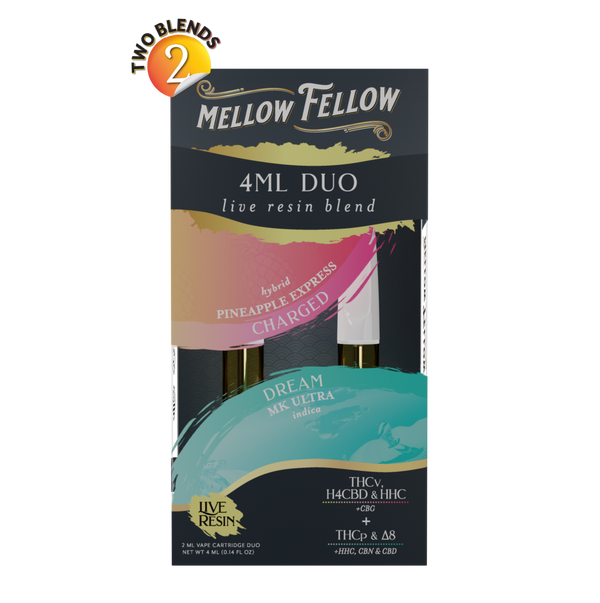THCv vs THC: Comparing Energy, Appetite Effects, and the Diet Weed Myth

If you've ever wished cannabis could help you stay focused and skip the munchies, THCv might be the cannabinoid you've been waiting for. Dubbed the "skinny cannabinoid" and rumored to boost energy, suppress appetite, and sharpen mental clarity, THCv has been making waves among health-conscious cannabis users.
But does it actually live up to the hype, or is it just clever branding wrapped in pseudoscience?
Today, we explore the real differences between THCv and THC, cut through the myths, and uncover what this rare cannabinoid really brings to the table.
Read out THCv vs. THC comparison to find out what THCv is all about.
Key Takeaways
-
THC and THCv have different molecular structures that impact how they interact with CB1 and CB2 receptors.
-
THCv can suppress appetite and support metabolism, earning it the nickname “diet weed,” though effects vary by dose.
-
THCv is known for its energizing, focus-enhancing effects, making it ideal for daytime or productivity use.
-
THC’s effects are stronger, more sedating, and longer-lasting, but can cause anxiety and increase hunger.
-
THCv has a shorter high with clearer, more functional psychoactivity—often described as less intoxicating than THC.
-
Both cannabinoids show unique medical potential, but THCv is being studied for metabolic health and anti-inflammatory benefits.
-
THCv remains harder to find due to production challenges and lower natural abundance, but availability is improving.
What Are THC and THCv? Understanding the Molecular Differences
To understand how THC and THCv affect the body differently, it's helpful to look at their structures.
-
THC (Delta-9-tetrahydrocannabinol) is the main psychoactive compound in cannabis—the one that produces the classic "high." It has a five-carbon side chain (called a pentyl group) that fits perfectly into the body's CB1 receptors, which are responsible for many of THC’s strong psychoactive effects.
-
THCv (tetrahydrocannabivarin) looks almost identical to THC but has one key difference: it has a three-carbon side chain (called a propyl group) instead of five. While this might seem like a small change, it dramatically alters how THCv interacts with the endocannabinoid system, especially the CB1 receptors, leading to unique effects that set it apart from THC.
At Mellow Fellow, our formulation team pays careful attention to these molecular distinctions when creating products like our Ghost Train Haze THCv vape, which takes advantage of THCv's unique properties for energy and focus. It’s a strong sativa with citrus, floral, and sour notes, so it’s sure to give you that boost you need for a long day ahead.
Receptor Activity: The Key to Understanding THCv vs THC Effects
The most fascinating aspect of THCv is its complex relationship with the body's cannabinoid receptors, which differs dramatically from THC's more straightforward activity.
THC functions primarily as a CB1 receptor agonist. It binds to these receptors and activates them, generally producing the euphoria, altered perception, increased appetite, and potential anxiety that characterize the traditional cannabis high.
This CB1 activation is also responsible for THC's well-known "munchies" effect, as CB1 receptors in the hypothalamus influence hunger and food intake when stimulated.
THCv, however, demonstrates a dose-dependent relationship with CB1 receptors that makes it unique in the cannabinoid world:
-
At low doses, THCv acts as a CB1 receptor antagonist. It binds to the receptor but blocks activation, potentially reducing the psychoactive effects of THC and suppressing appetite.
-
At higher doses, THCv can switch functions and become a CB1 receptor agonist, producing psychoactive effects somewhat similar to THC, though generally less intense and shorter in duration.
This variable relationship with CB1 receptors explains why THCv can produce such different effects depending on the amount consumed. Research published in the British Journal of Pharmacology confirms this dual activity, noting THCv's ability to antagonize CB1 receptors at lower concentrations while activating them at higher doses.
THCv also shows activity at CB2 receptors, potentially offering anti-inflammatory benefits similar to CBD. This balanced receptor activity contributes to THCv's unique effect profile that many of our customers appreciate in products like our Lemon Skunk THCv vape, a lemony-sweet option perfect for clearing your mind.
For a deeper comparison of THCv with other novel cannabinoids, our article on THCB vs THCv provides additional insights into their distinctive properties.
The Appetite Question: Is THCv Really "Diet Weed"?
Perhaps the most widely circulated claim about THCv is its supposed ability to suppress appetite and potentially aid weight loss, earning it nicknames like "diet weed" and "skinny cannabinoid." But what does the science actually say?
Research on THCv's appetite effects shows promising but limited evidence:
-
A 2013 study published in Nutrition & Diabetes found that THCv helped improve how the body responds to insulin, potentially increasing metabolism and reducing blood sugar levels.
-
A recent study published in the Journal of Cannabis Research demonstrated how THCv has the ability to decrease food intake and thus body weight.
-
A study published in 2025 in Cannabis, in a small human study, showed that daily use of THCv and CBD led to weight loss, smaller waistlines, lower blood pressure, and improved cholesterol, especially at the higher dose.
-
Yet another recent study published in 2025 in AIMS Neuroscience demonstrates that THCv has the potential to upregulate the metabolism, leading to greater calorie burn and supporting healthy weight goals.
What we know from both research and consistent customer feedback is that THCv typically doesn't trigger the intense hunger many associate with THC and, in some cases, might temporarily reduce appetite.
Our Burn Blend Wellness Gummies, which contain THCv alongside other metabolism-supporting cannabinoids, reflect this potential benefit without making exaggerated claims. With 300mg of rapid-release THCv, these gummies support a healthy metabolism, high energy levels, and your fitness goals.
-
One customer using our THCv products reported: "I love that I can enjoy this during the day without raiding the pantry afterward—it gives me a nice lift without the munchies. Though I wouldn't call it appetite suppression, it's more like appetite neutrality."
For those interested in learning more about this cannabinoid's fundamental properties, our comprehensive guide on THCv offers a deeper exploration of its characteristics and effects.
Energy and Focus: THCv's Most Promising Effects
THCv's energizing and focus-enhancing properties represent its most consistently reported benefits.
Unlike THC, which often produces relaxation or sedation (particularly in indica-dominant strains), THCv typically creates a clear-headed, stimulating experience characterized by:
-
Enhanced mental clarity and focus
-
Increased energy levels
-
Improved motivation
-
Reduced mental fog
-
Shorter duration of effects (two to three hours compared to THC's four to six hours)
These qualities make THCv particularly valuable for daytime use when productivity and mental sharpness remain priorities. A recent placebo-controlled study in Cannabis and Cannabinoid Research demonstrated that THCv has great potential to improve focus and attention span.
The shorter duration also makes THCv practical for those seeking functional effects without committing to a full afternoon of altered consciousness.
Our formulation specialists have observed these effects consistently in products like our Limitless Blend Mandarin Cookies Vape, which combines THCv with complementary cannabinoids for enhanced focus and energy.
Many users find our Energy Blend Wellness Gummies particularly effective for sustained focus and productivity, as they offer a balanced combination of THCv with other supportive cannabinoids in a convenient edible format, with each gummy containing 50mg of cannabinoids.
Psychoactivity Profile: How Do THCv and THC Highs Differ?
Another key difference between these cannabinoids involves their psychoactive effects—the subjective "high" they produce.
THC creates the classic cannabis high characterized by:
-
Euphoria
-
Altered sensory perception
-
Time distortion
-
Potential anxiety and paranoia at higher doses
-
Full-body relaxation (particularly with indica strains)
-
Pronounced cognitive effects
THCv's psychoactivity is noticeably different:
-
More clear-headed and lucid
-
Less intense mental alteration
-
Reduced anxiety potential
-
Energetic rather than sedating
-
Shorter duration
-
Requires higher doses to become significantly psychoactive
Many users describe THCv's effects as more functional and manageable, allowing for a pleasant feeling without the cognitive impairment often associated with THC. Overall, research shows that THCv has a distinct lack of psychoactive effects when compared to THC.
This makes THCv particularly appealing to those looking for subtle effects related to attention, mood, and energy, rather than the profound psychoactive effects associated with THC.
Our customers frequently mention appreciating the balanced nature of our Clarity Blend with Café Racer terpenes, noting that the THCv component creates an energizing, focused experience without the mental cloudiness sometimes experienced with THC-dominant products.
Medical Potential: Comparing Therapeutic Applications
Beyond their recreational differences, THC and THCv show distinct potential medical applications supported by preliminary research.
THC has been extensively studied for:
-
Chronic pain management
-
Nausea and vomiting (particularly in chemotherapy patients)
-
Appetite stimulation
-
Sleep disorders
THCv research, while less extensive, suggests potential benefits for:
-
Metabolic disorders and obesity
-
Improving glucose tolerance and insulin sensitivity
-
Anxiety without THC's potential anxiogenic effects
It's worth noting that most medical applications for THCv remain in early research phases, with more clinical studies needed before definitive claims can be made. However, the preliminary evidence suggests THCv may eventually establish its own unique place in therapeutic cannabis applications.
Our Momentum Blend CBD Tincture incorporates THCv alongside CBD and other supportive compounds to create a wellness-focused product that takes advantage THCv and CBD’s unique properties. It also features limonene, a cannabis terpene known for its ability to boost mood and energy.
Finding the Right Balance: How THCv and THC Work Together
Rather than viewing THCv and THC as competitors, many users and product developers recognize the potential benefits of combining these cannabinoids in balanced ratios—leveraging the entourage effect for enhanced benefits.

When combined thoughtfully, THCv may:
-
Moderate THC's appetite-stimulating effects
-
Reduce THC-induced anxiety at lower doses
-
Add energizing qualities to THC's euphoria
-
Potentially offer metabolic benefits alongside THC's other therapeutic effects
This synergistic approach explains why our Wanderlust Blend Star Monkey Disposable Vape and formulations for focus and energy typically contain precisely calibrated combinations of THCv, THC, and other complementary cannabinoids rather than isolated compounds. This vape, for instance, is perfect for inducing a state of tranquil calm.
A balanced cannabinoid approach often produces more nuanced, beneficial effects than single-compound products, a principle that guides our entire product development philosophy at Mellow Fellow.
For those interested in metabolism support alongside focus-enhancing effects, our Burn Blend gummies offer a convenient option with a carefully formulated ratio of beneficial cannabinoids. Loaded with rapid-release THCv, they’re perfect for experiencing the metabolism and mood-boosting potential that this cannabinoid brings to the table.
THCv Accessibility: Sourcing and Availability Challenges
Despite growing interest in THCv, several factors make it less readily available than THC:
-
Natural Scarcity: THCv occurs in much lower concentrations in most cannabis strains, typically less than 1% compared to THC's potential 20-30% content.
-
Strain Specificity: Only certain landrace strains (particularly those of African origin like Durban Poison) naturally contain notable THCv levels.
-
Production Challenges: Extracting and isolating THCv requires specialized techniques, increasing production costs.
-
Limited Market Maturity: As a relatively new cannabinoid of commercial interest, fewer manufacturers currently produce THCv products.
These factors contribute to the higher cost and limited variety of THCv products compared to THC offerings. However, as interest continues to grow and production techniques improve, accessibility will likely increase in coming years.
For those interested in experiencing THCv's unique effects, products like our Charged Blend cartridges offer a convenient and reliable way to incorporate this cannabinoid into your routine.
Beyond Hype: Realistic Expectations for THCv
With marketing often outpacing science, it's important to establish realistic expectations for what THCv can and cannot do:
What THCv realistically offers:
-
A more energetic, clear-headed experience compared to THC
-
Potentially reduced "munchies" effect
-
Shorter duration high
-
Possible benefits for focus and productivity
-
Unique entourage effects when combined with other cannabinoids
What THCv is unlikely to provide:
-
Dramatic weight loss results as a standalone solution
-
Complete appetite suppression
-
Total elimination of THC's psychoactive effects when combined
-
Miracle treatment for metabolic conditions
While we're excited about THCv's distinctive properties and include it in several Mellow Fellow blends, we're committed to honest education that avoids overpromising or perpetuating unfounded myths. Our Charged Blend and energy-focused products are formulated based on documented properties of THCv rather than exaggerated marketing claims.
Who Might Prefer THCv Over Traditional THC?
Based on THCv's unique properties, certain users may find it particularly well-suited to their needs:
-
Daytime cannabis users seeking functionality without sedation or brain fog
-
Productivity-focused consumers looking for potential focus enhancement
-
Those sensitive to THC anxiety who want a potentially clearer experience
-
Creative professionals wanting subtle enhancement without cognitive impairment
-
Cannabis users concerned about appetite stimulation who prefer to avoid the munchies
-
Those seeking shorter duration effects for time-limited experiences
Conversely, THCv might be less appropriate for:
-
Users specifically seeking deep relaxation or sleep aid
-
Those using cannabis primarily for appetite stimulation
-
Individuals looking for long-lasting effects
-
Users seeking maximum psychoactivity
The growing interest in effect-specific cannabinoid products reflects an evolving cannabis marketplace increasingly catering to specific desired outcomes rather than generic experiences, a trend we've embraced at Mellow Fellow with our mood and effect-based product categorization.
Different Forms: How to Experience THCv
For those interested in exploring THCv's unique effects, several consumption options exist, including vapes, edibles, tinctures, specialized cannabis strains, and isolate products.
Vape Products
Vaping remains the most popular method for experiencing THCv due to rapid onset and precise dosing control. Our THCv-containing vape products offer a convenient entry point with carefully calibrated cannabinoid ratios.
Featured THCv Vape
The Adventure Blend Blue Garlic Vape delivers a fun twist of blueberry sweetness with a savory garlic finish, an unexpectedly smooth combo that’s both bold and comforting. Infused with HHC, Delta 8, Delta 10, THCv, and more, it’s crafted to spark energy, uplift your mood, and ease stress without slowing you down.
Edibles and Gummies
Though less common than vapes, some manufacturers now offer THCv-infused edibles. The effects through this route may take longer to manifest (45-90 minutes) but potentially last longer than vaping.
Featured THCv Edible
The Focus Blend Tropic Medley Gummies pack clarity and calm into a tropical-flavored gummy. Each piece blends extended-release THCv and CBD to help sharpen your focus while easing daily stress. With 20mg per gummy, this wellness-forward formula is perfect for powering through projects or staying centered on busy days.
Tinctures
Oil or alcohol-based THCv tinctures provide flexible dosing and moderate onset timing between vaping and edibles.
Featured THCv Tincture
The Energy Blend Mint Tincture is your minty-fresh boost for brighter mornings and focused afternoons. Each drop combines CBD, CBG, CBC, and THCv with energizing limonene for a smooth surge of clarity and calm. The 1500mg formula is designed to shake off sluggishness and help you stay sharp without jitters.
Specialized Cannabis Strains
Some cultivators have developed strains with naturally higher THCv content, though these remain relatively rare in most markets.
Isolate Products
For those seeking THCv without other cannabinoids, some companies offer isolated THCv, though this approach misses potential entourage benefits.
For most users, products that thoughtfully combine THCv with complementary cannabinoids offer the most balanced and beneficial experience, which is why our Charged Blend collection incorporates precise ratios of multiple compounds rather than isolated THCv.
Safety Considerations: THCv vs THC Risk Profiles
Both THC and THCv have generally favorable safety profiles, especially when compared to many pharmaceuticals. Still, there are some important differences and risks to be aware of.
THC Safety Considerations
THC can cause anxiety and paranoia, especially at higher doses. It may impair your ability to drive or operate machinery safely.
Temporary memory issues and reduced cognitive function are also possible. In some cases, heavy or long-term use may lead to psychological dependence. THC is not recommended for individuals with certain psychiatric conditions, as it can worsen symptoms.
THCv Safety Considerations
Less research is available on the long-term safety of THCv. Like other cannabinoids, it may interact with medications. Its safety during pregnancy is not well understood, so it should be avoided.
While the risk of dependence appears to be lower than with THC, data is still limited. Interestingly, some studies suggest that THCv may help reduce THC-induced anxiety when used in appropriate amounts.
As with any cannabinoid, it’s best to start with a low dose and increase slowly. This helps you gauge your personal response and lowers the risk of unwanted side effects.
Legal Status of THCv and THC
The legal landscape for cannabinoids is complex and continues to evolve. While THC and THCv are chemically related, their legal treatment often differs.
THC Legal Status
THC is federally illegal in the United States when derived from marijuana. It is legal in states that have passed recreational cannabis laws. However, hemp-derived THC is federally legal only if it is present in amounts below 0.3%.
THCv Legal Status
THCv currently exists in a federal gray area. It is not specifically listed as a controlled substance. When derived from hemp, THCv is generally considered legal. That said, its legal status varies widely at the state level, and some regions may restrict its sale or use.
Because cannabinoid regulations change frequently, it's important to stay updated. Refer to our dedicated article on THCv legality for the latest information. Always check your local laws before buying or using any cannabinoid product.
Conclusion: Finding Your Ideal Cannabinoid Balance
THCv offers a distinct alternative to traditional THC, especially for those looking to avoid the munchies, reduce mental fog, and boost daytime productivity. While it doesn’t deliver the intense euphoria of THC, its unique interaction with cannabinoid receptors results in more focused, energizing effects that many users find easier to manage.
Research shows THCv may support metabolism, appetite regulation, and blood sugar control, making it especially promising for wellness-focused consumers. However, THCv isn’t a magic solution for weight loss, and its availability remains limited.
If you’re seeking a clear-headed, short-duration experience that supports focus and energy without the typical THC drawbacks, THCv may be the better fit. Products like our Focus, Energy, and Burn blends are crafted specifically for these benefits, offering thoughtful ratios of THCv with supportive cannabinoids.
Ready to experience THCv's unique effects for yourself? Browse our collection of THCv-containing blends formulated for focus, energy, and productivity.
Frequently Asked Questions
Is THCv Legal in All States?
THCv is federally legal if derived from hemp, but state laws vary widely. Always check local regulations before purchasing.
Can THCv Help With ADHD or Focus Issues?
Early research suggests THCv may improve attention and mental clarity, but it is not an approved treatment for ADHD.
Does THCv Cause a High Like THC?
At high doses, THCv can produce a mild high, but it is typically less intense and shorter-lasting than THC.
How Long Does THCv Last Compared to THC?
THCv effects usually last two to three hours, while THC effects can last four to six hours or more, depending on the dose and delivery method.
Can You Combine THCv and THC Together?
Yes. When combined, THCv may reduce THC’s side effects while enhancing energy, focus, and appetite control. Many blends use both.
Sources
Share on Social













Leave a comment